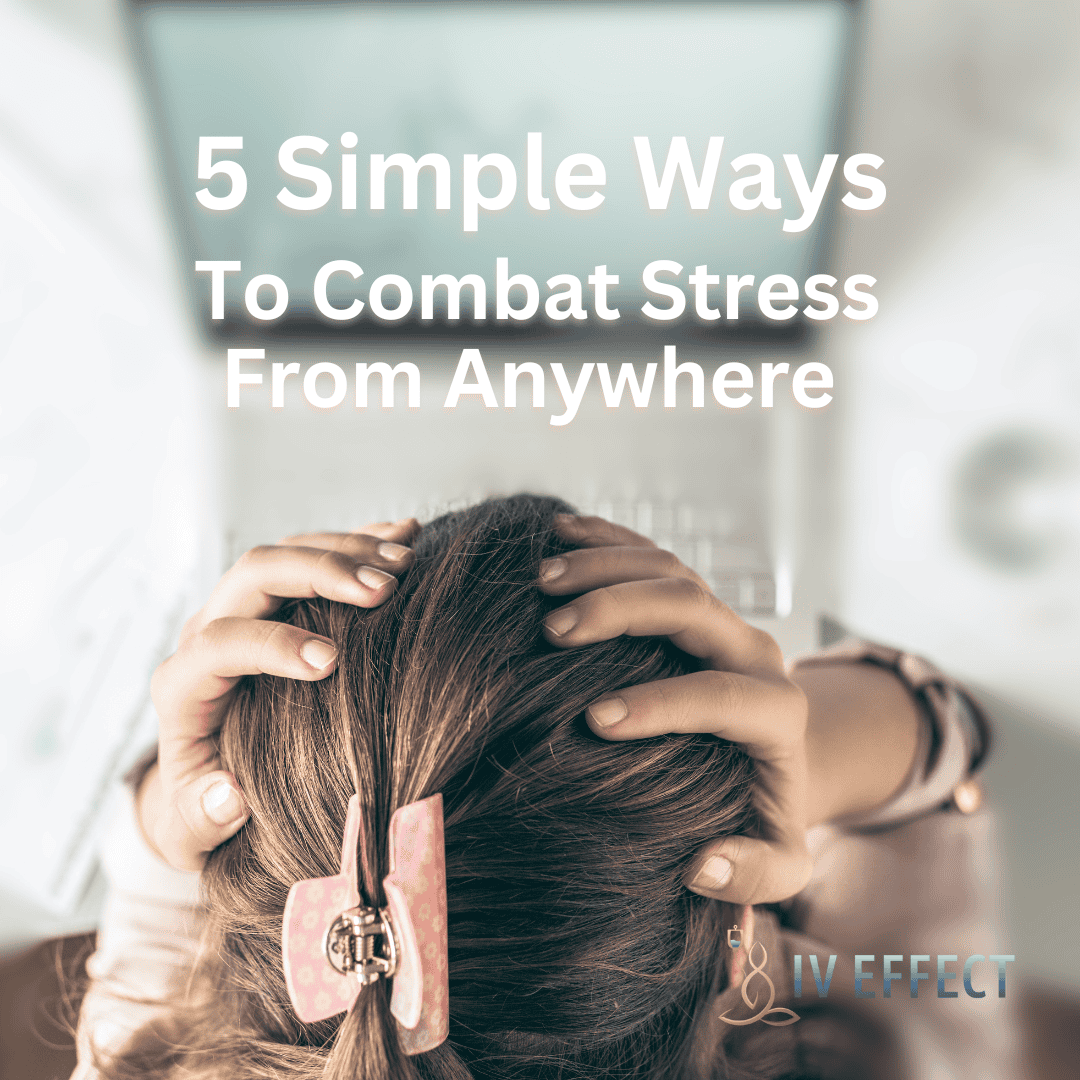
11 Jul 5 Simple Ways To Combat Stress From Anywhere
It is no secret that we are living in extremely stressful times, to put it lightly. Stress can be detrimental to one’s health and can exacerbate chronic diseases like heart disease, autoimmune conditions, diabetes, and even cancer. Not to mention that it hinders the quality of life for most. Which is why we created this short guide to provide you with five simple but powerful ways you can counter the stressors of your everyday life no matter where you are.

1. Go For A Walk
Going for a nice walk is one of the easiest and simplest things you can do when you are feeling overwhelmed by stress. Going outside to get some fresh air and sunlight can really help lower stress levels. This gives you some time to take a break from your internal worries, allows you to reconnect with your physical self, and just be in the world around you, even if it is just for 15 minutes.
Pro Tip: Take your shoes off and walk barefoot (preferably on the grass or dirt). This is something called “Grounding”, which allows you to electrically reconnect with the earth. By doing this, you are exposing your body to the electrons emitted from the earth, which are transferred from the ground to your body. These electrons have been reported to improve chronic pain, anxiety, depression, and even sleep disorders, which can ultimately affect your stress levels in an incredibly positive way.
2. Meditate
There are several studies that have shown that meditation is an effective tool for stress management. When practiced consistently, meditation can aid in reprograming the brain by increasing its capacity to manage everyday stress.
Stress can trigger what’s called the “fight or flight” response of your Autonomic Nervous System (ANS), which floods your body with stress hormones like epinephrine and cortisol. If left unchecked, this stress response and become overactive and lead to an array of health concerns like heart attacks and strokes.
Through meditation, we can activate the relaxation response of the ANS, which can lead to lowering those stress hormones, blood pressure, heart rate, and more.
You can practice meditation by sitting in a quiet space with your eyes closed and focusing on your breath. Feel the rise and fall of your body after each breath. Use your breath as an anchor when you start to notice your mind wandering off. This can take lots of practice, so try not to be too hard on yourself.
Pro Tip: Most people find that doing a guided meditation is the easiest way to get started. Some popular apps to start your journey are Headspace, Calm, and even YouTube.
3. Move
Exercising is one of the best stress-reducing activities you can do for yourself. Physical activity causes your body to release “feel-good” hormones called endorphins, which can give you a sense of euphoria to combat high stress levels. On top of that, exercising can boost the body’s ability to utilize oxygen and improve blood flow, which can increase your overall health, which can indirectly reduce stress.
It does not matter necessarily what you do as long as you MOVE. Things like biking, swimming, running, playing sports, or even dancing. The key is to make it something you enjoy and not something you dread.
Pro Tip: The app called “7 Minute Workout” is a free app that provides a full-body workout that you can do from anywhere in just seven short minutes.
4. Eat A Clean(er) Diet
It’s no secret that what you put into your body matters. A poor diet can lead to spikes in blood sugar and then cause it to crash, which can play a big role in anxiety and stress. By fueling your body with poor quality food, you are not providing the body with what it needs to function at an optimal level. Stress is inevitable when all your bodily functions are operating poorly.
Even just eliminating, or limiting things like alcohol, refined carbs and sugar, and caffeine you are all you are giving yourself an advantage to sleep better and function more efficiently as this can result in less stress.
Once you have got that down, you can focus on providing your brain and body with nourishing foods like nuts and seeds, fatty fish, organic fruits and veggies, and grass-fed or pasture-raised meats.
Pro Tip: Eat as close to nature as you can. If it came from a factory or has a lengthy ingredient list of words you can’t pronounce, it probably isn’t your best option.
5. Breathwork
Our breath is without a doubt one of the most underutilized tools that we have to combat stress and boost our overall vitality. Deep, mindful breathing has a calming, relaxing effect on the mind and body.
Through breathwork, one can activate the body’s natural relaxation response by stimulating something called the vagus nerve, which can change the physical and emotional response to stress. This directly combats the stress response of the body.
Just like meditation, breathwork can be quite simple. It can involve taking a few full belly breaths or can be as advanced as the Wim Hof Method (Google him). One thing is for sure, breathing is not something we think about all of the time since it is controlled automatically, but when you practice intentionality with your breathing you can tap in to one of the most powerful things you can do to radically improve your overall wellbeing.
Pro Tip: An easy but effective breathing technique is something called “Box Breathing.” This is where you slowly inhale for 3–5 seconds. Hold for 3–5 seconds. Exhale for 3–5 seconds. Hold for 3–5 seconds, then repeat for about 5 minutes.
Stress in life is inevitable and, most of the time, out of our control. What we can control is how we manage that stress and prime our mind and body to be more resilient to that stress. We hope this quick guide will be of use to you in the near future.

Sorry, the comment form is closed at this time.